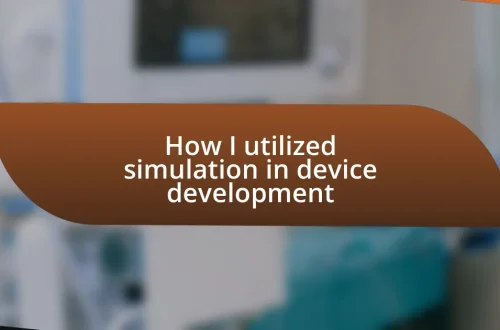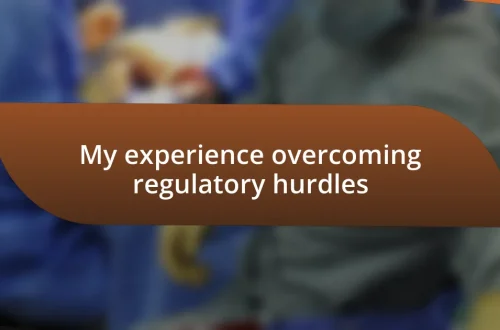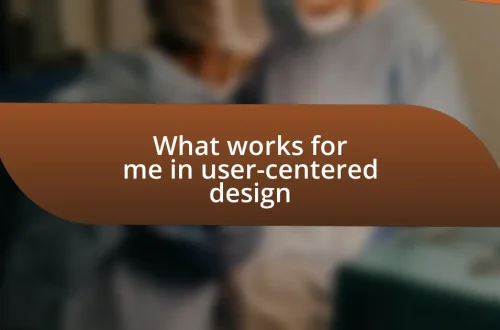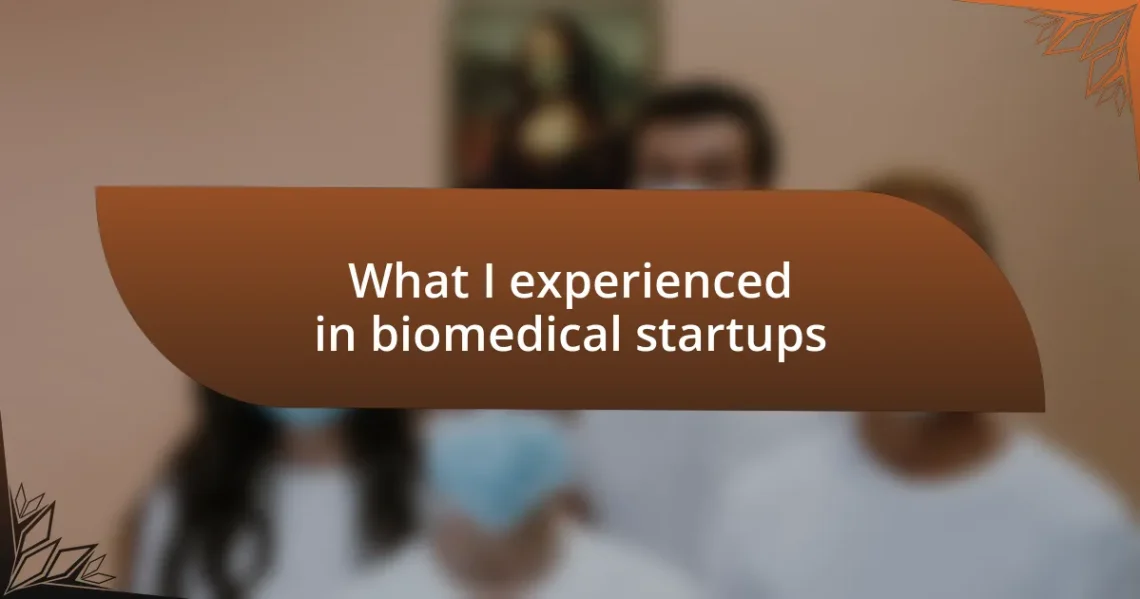
What I experienced in biomedical startups
Key takeaways:
- Biomedical startups have the potential to transform healthcare through innovative ideas and personal commitment to improving lives.
- Key challenges include securing funding, navigating regulatory hurdles, and building cohesive teams amidst resource constraints.
- Flexibility and effective communication are essential during clinical trials to adapt to unexpected outcomes and ensure collaborative success.
- Future trends in biomedical entrepreneurship emphasize personalized medicine, telemedicine, and sustainability as crucial for market relevance and growth.
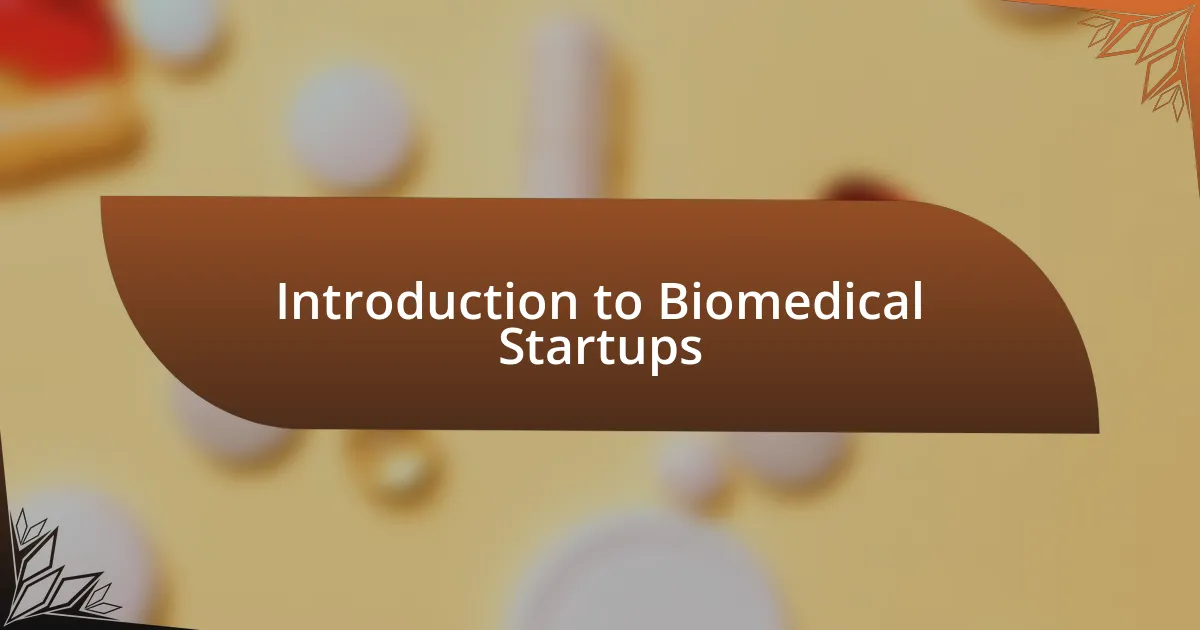
Introduction to Biomedical Startups
The world of biomedical startups is a vibrant tapestry of innovation and entrepreneurial spirit. When I first ventured into this space, I was struck by the sheer potential of ideas transforming into life-saving technologies. Have you ever realized how a small team can change the course of healthcare with just a groundbreaking concept?
One of my initial experiences was witnessing a group of passionate scientists turned entrepreneurs desperate to bridge the gap between research and practical application. It reminded me that this field doesn’t just serve investors; it’s about real people striving to make a difference. This personal journey in the biomedical sector taught me that the stakes are incredibly high, and the emotional investment from the founders often reflects a profound commitment to improve lives.
Every startup has its own rhythm, a pulse driven by the urgency of medical needs and the desire to solve them. With each challenge I faced, whether designing a product or navigating regulatory hurdles, I often wondered, “How many breakthroughs are left to uncover?” It is this constant pursuit of knowledge and impact that fuels the innovative spirit in biomedical startups.
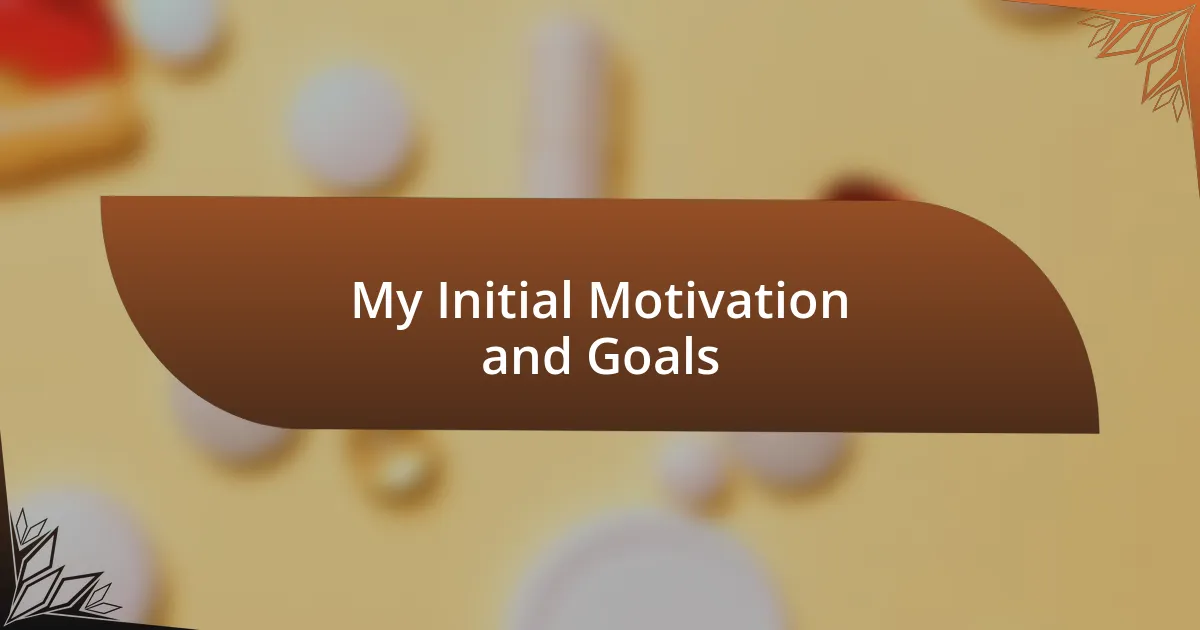
My Initial Motivation and Goals
When I first entered the world of biomedical startups, my motivation was fueled by a desire to contribute to meaningful change. The potential for developing cutting-edge solutions that could improve patient outcomes captivated me. I vividly recall a moment where I met a family whose lives were dramatically altered by a new medical device; it cemented my commitment to pursuing innovation in healthcare.
Setting clear goals was essential in my early journey. I wanted to combine my technical skills with my passion for helping others, so I focused on two main objectives: creating impactful products and navigating the complexities of healthcare regulations. Each milestone, big or small, reinforced my drive, particularly when I could see tangible results from collaborative efforts within my team.
Throughout this journey, I often asked myself, “What legacy do I want to leave in the biomedical field?” This question challenged me to think deeply about the outcomes of my work. I eventually realized that my ultimate goal wasn’t just to create a successful startup but to cultivate a culture of empathy and innovation that inspires others to push boundaries for humanity’s sake.
| Initial Motivation | Goals |
|---|---|
| Contributing to meaningful change | Develop impactful products |
| Passion for improving patient outcomes | Navigating healthcare regulations |
| Inspiring innovation | Cultivating a culture of empathy |
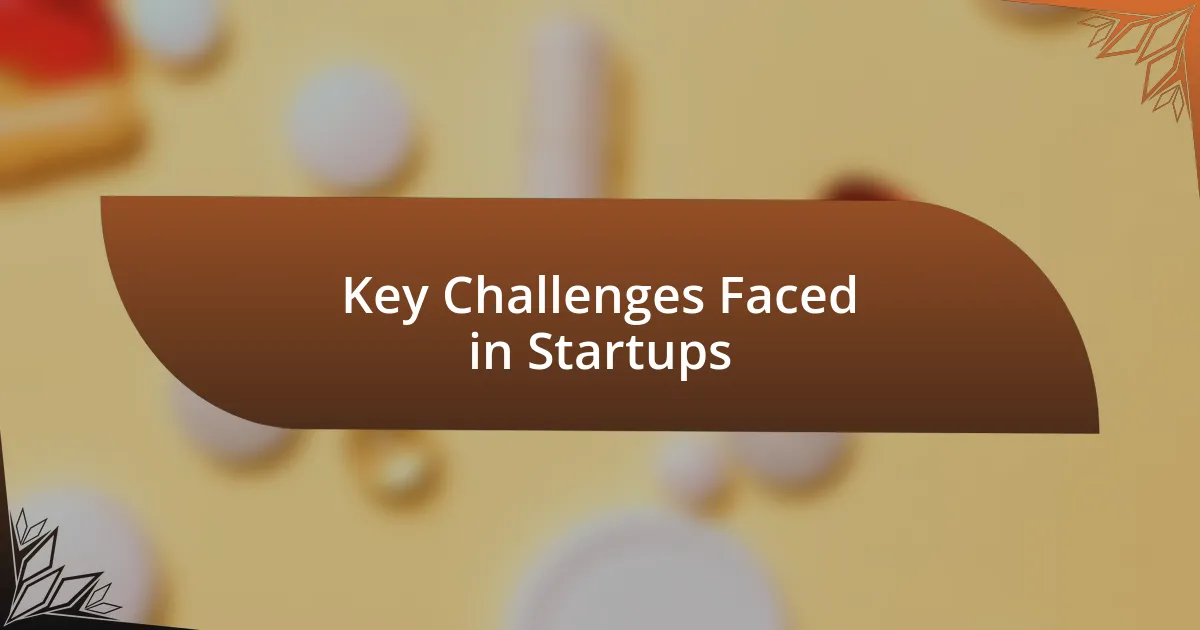
Key Challenges Faced in Startups
The landscape of biomedical startups is riddled with challenges that can often feel daunting. I distinctly remember facing the uphill battle of securing funding. In the early days, I poured my heart into crafting pitch decks, only to be met with skepticism from potential investors. It’s a tough spot to be in when you believe so strongly in your vision, yet many others don’t see it yet. The journey can be incredibly isolating, but persistence becomes your greatest ally.
Here are some key challenges faced:
- Securing Funding: Convincing investors to take a chance on innovative, yet unproven ideas.
- Regulatory Hurdles: Navigating complex healthcare regulations can feel like running through a maze.
- Resource Constraints: Operating with limited financial and human resources often forces tough decisions.
- Market Competition: Standing out in a crowded market where multiple solutions vie for attention.
- Team Dynamics: Building a cohesive team while managing diverse personalities and skill sets can be challenging.
Every setback has a lesson to teach; it pushes the boundaries of resilience. I often found myself reflecting on why I started this journey, reminding myself that the passion for improving lives was my guiding star.
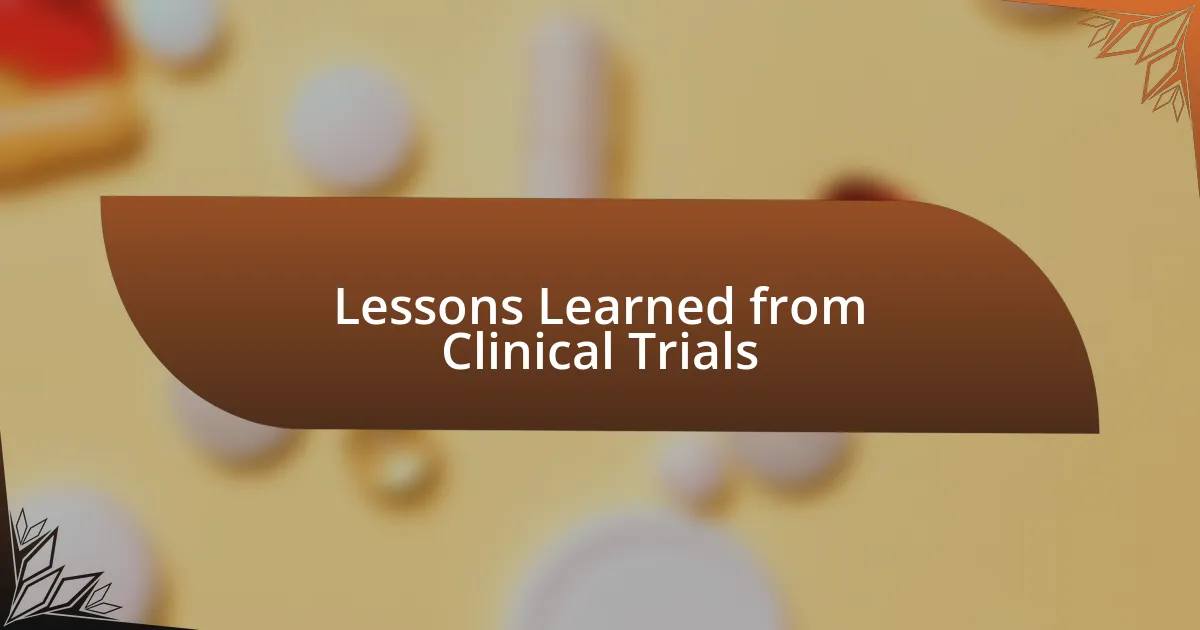
Lessons Learned from Clinical Trials
One of the biggest lessons I learned during clinical trials is the importance of flexibility. In one of my earlier projects, a promising drug showed unexpected side effects during trials. I remember feeling that pit in my stomach, thinking, “How could we have missed this?” It taught me that relying solely on pre-trial hypotheses isn’t enough; being adaptable in my approach turned that setback into an opportunity for further investigation.
Communication also emerged as a critical element during the trial phases. I vividly recall a situation where miscommunication between our team and an external lab led to inconsistent data. It was frustrating, but it made me realize that fostering an open line of dialogue is essential. When everyone is on the same page, it reduces errors and creates a collaborative atmosphere that benefits the trial’s outcomes.
Moreover, engaging with participants transformed my outlook on the research process. I was hesitant at first, thinking, “Why would trial participants want to talk to me?” But once I started listening to their experiences, I found that their insights were invaluable. It’s one of those moments where you think you’re the expert, only to discover that the real experts are the patients themselves. That connection not only helped refine our project but also deeply humanized the entire process for me.
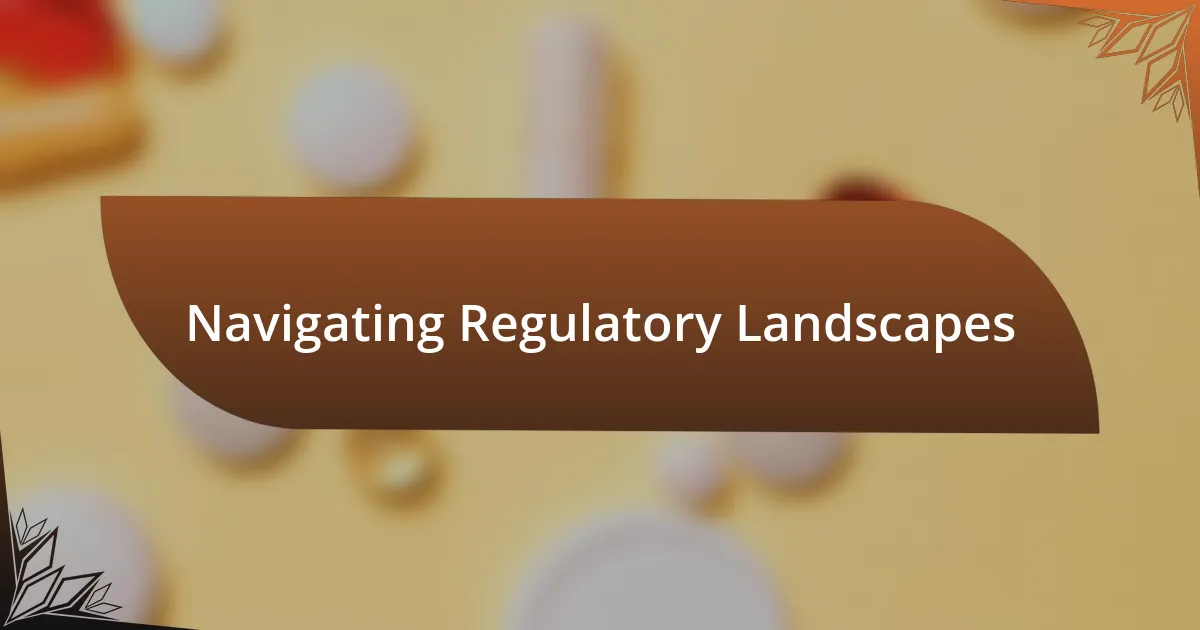
Navigating Regulatory Landscapes
Navigating the regulatory landscapes in biomedical startups can feel like walking a tightrope. I remember the first time I faced a regulatory submission; I thought I had dotted every ‘i’ and crossed every ‘t’. However, receiving feedback from regulatory bodies highlighted nuances I had completely overlooked. This experience underscored how attention to detail and understanding the specific requirements of different regulatory agencies are crucial for success.
One of my most challenging moments came when we had to pivot our strategy due to changing regulations. Rather than viewing this as a setback, I learned to embrace it as an opportunity to innovate. Have you ever felt overwhelmed by compliance challenges? It’s a common feeling, but by turning that anxiety into proactive solutions, I discovered new pathways for our product’s development that ultimately strengthened our position in the market.
Collaboration with regulatory experts became a game-changer for our team. I still recall our regular meetings where we’d pour over guidelines and share insights. It was enlightening to see how their expertise could simplify complex processes. Those discussions not only clarified my understanding but also built my confidence to tackle regulatory hurdles. Engaging with these professionals made the regulatory landscape feel less like a maze and more like a map guiding us to success.
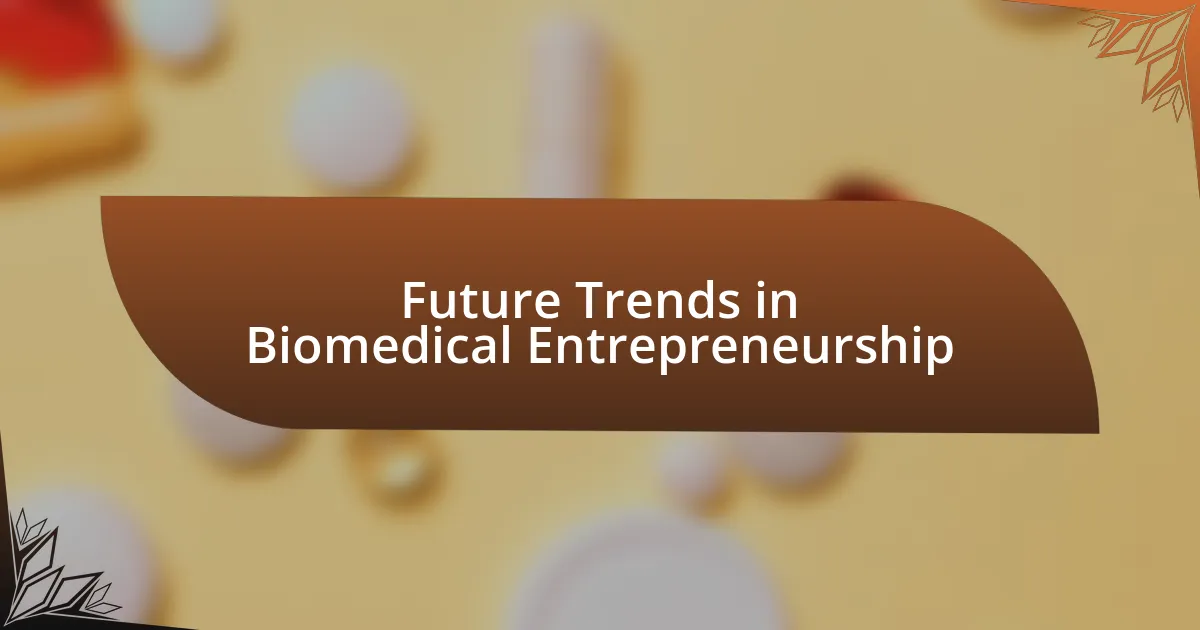
Future Trends in Biomedical Entrepreneurship
As I look ahead, I see a remarkable shift towards personalized medicine in the biomedical sector. This trend increases the demand for startups that harness data analytics to tailor treatments to individual patients’ needs. I remember when our team first embarked on a project focused on genomics; the excitement of merging technology with healthcare was palpable. Have you ever marveled at how technology can open doors to completely new treatment possibilities? It’s moments like these that fuel my passion for innovation.
Another compelling trend is the rise of telemedicine and digital health solutions. I experienced this firsthand when we shifted to virtual consultations during the pandemic. It vastly improved our outreach and allowed us to gather patient feedback more efficiently. I often wonder how many barriers we’ve broken down because of this digital evolution. The convenience and accessibility that telehealth provides are game-changers for patient engagement and startup growth.
Moreover, sustainability is becoming integral to biomedical entrepreneurship. It’s not just about developing breakthrough products anymore; it’s also about how those products impact our planet. In one project, we made conscious choices to minimize waste during development, and I found it both rewarding and challenging. Can a commitment to sustainability actually enhance a startup’s market appeal? Based on my experience, it certainly can—investors and consumers alike are looking for companies that prioritize ethical practices.


